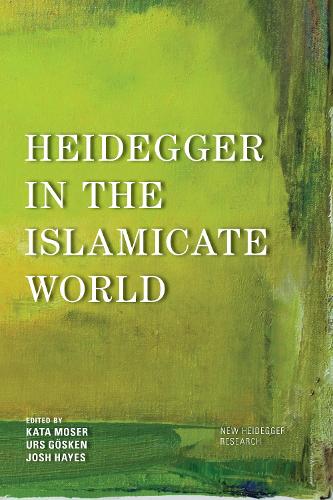
Heidegger in the Islamicate World
(Hardback)
Publishing Details
Heidegger in the Islamicate World
By (Author) Kata Moser
Edited by Urs Gsken
Edited by Josh Michael Hayes
Bloomsbury Publishing PLC
Rowman & Littlefield International
28th February 2019
United Kingdom
Classifications
Professional and Scholarly
Non Fiction
Islam
193
Physical Properties
Hardback
326
Width 159mm, Height 232mm, Spine 30mm
671g
Description
Philosophical debates, many of them involving the appropriation of modern Western philosophical doctrines, are a crucial element shaping the intellectual and practical behaviour of many thinkers in the Islamicate world and their audiences. One Western philosopher currently receiving a particularly lively reception throughout the Islamicate world is Martin Heidegger. This book explores various aspects of the reception of Heideggers thought in the Arabic, Iranian, Turkish, and South Asian intellectual context. Expert Heidegger scholars from across the Islamicate world introduce and discuss approaches to Heideggers philosophy that operationalize, recontextualize, or review it critically in the light of Islamic and Islamicate traditions. In doing so, this book imparts knowledge of the history and present situation of Heidegger's reception in the Islamicate world and suggests new pathways for the future of Heidegger Studies pathways that associate Heideggers thought with the challenges presently faced by the Islamicate world.
Reviews
Heidegger is a radical Abrahamic thinker who spoke a Greek language. When the Muslims lost their own thinking apparatus, they did not find better than Heideggers secularized Christian concepts to learn about their new self-experience. Heidegger in the Islamicate World is a high-quality conceptual and spiritual experimentation workshop for the encounter between Abraham's descendants but in a post-secular horizon where colonialism can become a metaphysical parody. -- Fethi Meskini, Author of Thinking After Heidegger
While much has been written about Heidegger and the East, historians of philosophy have passed over in silence appreciations and interpretations of Heideggerian thought in the Islamicate world. By highlighting the link between Islamic thinkers and the work of Heidegger, this edited volume underscores, for the first time, the importance of examining the legacy of a hermeneutic adventure in the twentieth century for a more complete and critical understanding of the history of modern and contemporary Islamic thought -- Ramin Jahanbegloo, Executive Director of the Mahatma Gandhi Centre for Nonviolence and Peace Studies, Jindal Global University
This is an much needed collection. Heideggers reception in Islamicate circles broadens the range of examples by which we understand philosophical engagements. This is a rare book, that prepares a path to a truly global philosophy in anticipation of a post-Western future. -- S. Sayyid, Professor of Social Theory and Decolonial Thought, University of Leeds
In this pioneering volume, the reader is expertly navigated through the astonishingly multifaceted readings of Heidegger in Arabic, Persian, Turkish, and Urdu. Heideggerian conceptsserve Islamic authenticity discourses as well as inspiring critical and innovative reflections on being, transendence, language and art. -- Anke von Kgelgen, Department of Islamic Studies and Modern Oriental Philology, University of Bern
Author Bio
Urs Gosken is Assistant Professor of Iranian Studies at the University of Bern. Kata Moser is an Associate Researcher at the Institute for Islamic Studies, University of Bern. Josh Michael Hayes is Assistant Professor of Philosophy at Alvernia University.
